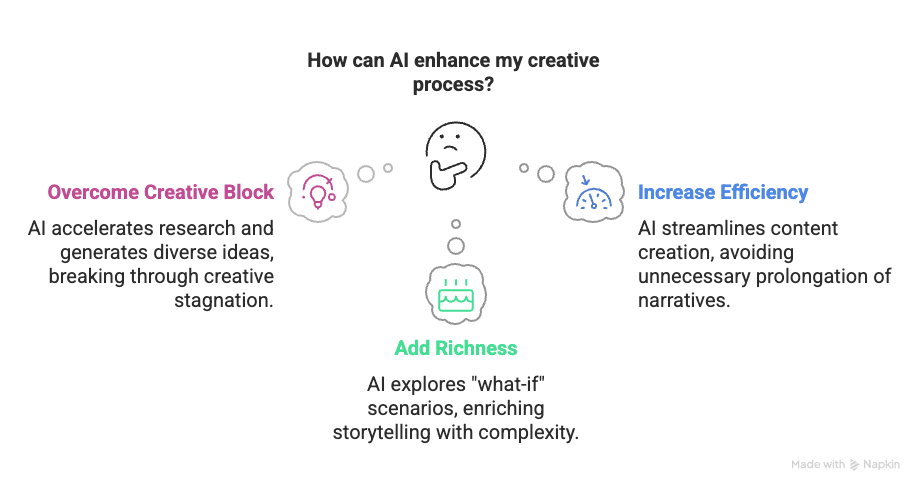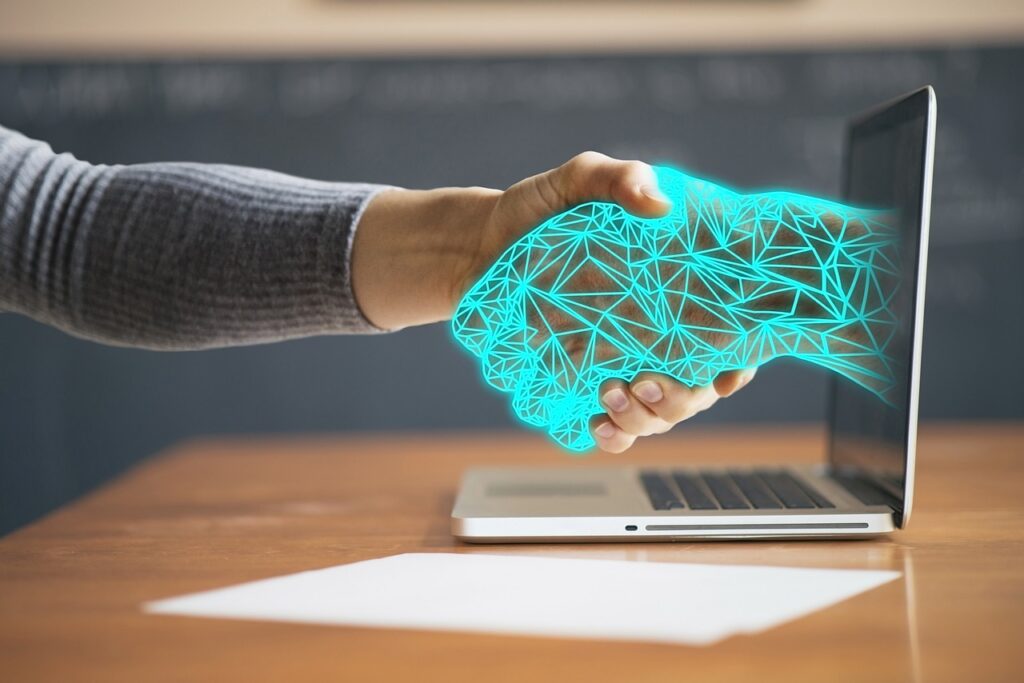AI in Storytelling: The Good, The Bad, and Avoiding Cliché
A good storyteller can create that gut punch that stays with you long after you’ve finished and Artificial Intelligence (AI) unfortunately cannot truly translate those emotions despite being able to mimic it
So will AI ever understand the complexities of human emotion?
Could a machine that has never experienced a hangover, heartbreak, or the existential crisis of choosing what to watch on Netflix really be any good at storytelling?
Welcome to the bizarre reality where algorithms are trying to muscle their way into humanity’s oldest art form. Storytelling.

Storytelling: The Engine of Human Connection
Stories aren’t just entertainment; they’re survival tools.
Long before LinkedIn posts and TED talks, our cave-dwelling ancestors used stories to warn each other about predators, remember where food was, and probably exiled that one guy who never helped with the mammoth hunting.
Fast-forward a few millennia, and we’re still using stories to make sense of chaos, rally teams around ideas, and even trick people into getting rich quick schemes.
Stories help us transform experiences into something people actually care about.
The best stories make you feel something. They create that gut punch that stays with you long after you’ve finished reading or watching. This emotional connection is what makes storytelling effective in everything from marketing campaigns to leadership strategies.
But now, AI has crashed the party. Like that friend who shows up uninvited and tries to DJ with their Spotify playlist of exclusively EDM covers.

The Authenticity Problem
Let’s address the elephant in the room – ‘AI doesn’t have a life.’
It’s never been dumped via text message(or ghosted), never ugly-cried during a dog’s loyalty movie, and never felt the strange mixture of confusion, terror, and expectation when your boss says, “Can I talk to you for a minute?”
This creates what I call the “Robot Therapist Problem”—AI can say all the right things without actually feeling any of them.
| What AI Thinks Heartbreak Sounds Like | What Heartbreak Actually Sounds Like |
| “I am experiencing significant emotional distress due to the termination of our romantic partnership.” | “I’ve been reminded of them with their scent on my clothes, which I haven’t washed in a week.” |
| “This unfortunate development has caused me to reevaluate my life priorities.” | “I made a Spotify playlist called ‘Songs to Cry in the Shower To,’ and it’s four hours long.” |
| “I am hopeful that time will facilitate emotional healing.” | “Me Googling ‘how to to get him/her back’? Or “What did I do wrong?” |
AI tools can build impressively complex fictional personalities by analyzing psychological patterns.
But without lived experience, there’s always something… off. Like seeing a Louis Vuitton bag having a sale online.
The Systematic Path: AI and Creativity
AI’s “creativity” is essentially a sophisticated game of remix.
It analyzes patterns from existing stories and recombines them in ways that seem novel but are fundamentally derivative. It’s like when your friend copies your homework at school and they just put in some different answers to throw the teacher off.
This poses a particular challenge for storytelling because the best stories don’t just follow patterns—they break them.
Would we have Fight Club if an algorithm had told Chuck Palahniuk that characters shouldn’t talk directly to readers?
How about Wall-E? In the first 40 minutes, human creativity shines through silent storytelling, where minimal dialogue captures profound emotions. Letting visuals convey loneliness and curiosity.
AI might focus too much on describing things, missing the beauty of subtle visuals.

Scene 1: When AI Becomes Your Weird But Helpful Writing Buddy
Despite its limitations, AI makes a surprisingly useful writing assistant.
Like having an assistant who never sleeps, never asks for credit, and never steals your lunch from the break room fridge.
AI can help you build characters with psychological depth that would uncover blind spots.
Want to create someone as complex as Walter White, the antihero, without spending months or years in therapy? AI can help map out psychological motivations, character flaws, and potential growth arcs in minutes. Giving you a spark of inspiration to coordinate unexpected twists or interconnected lots.
It’s particularly good at helping you:

But there’s a catch.
AI is trained on existing stories. AI lacks the intuition and personal inspiration that drive truly original and disruptive storytelling.
Scene 2: Stories That Stalk You (In a Technically Legal Way)
We’ve entered the era of the “stalker story”.
You know how your Youtube/Netflix feed suggests you videos to watch?
The algorithm is actively feeding you based on what you’ve been watching. When a platform knows exactly what keeps viewers watching, stories start being engineered like addictive snack foods. “Just one more episode” becomes the storytelling goal, not “create something meaningful.”
Brands are discovering the effectiveness of AI to whip up custom advertising campaigns.
Here’s what they’re doing:
- Personalized Campaigns: Because who doesn’t want ads that feel like they know you better than your friends?
- Emotional Stories: Ads that tug at your heartstrings because nothing says “authentic connection” like a computer-generated narrative.
This is all wonderful, but there are some potential downsides:
- Excessive Personalization: Are we really letting algorithms trap us in cozy little bubbles of our own tastes?
- New Perspectives: Is AI going to enlighten us with fresh ideas or just keep us stuck in echo chambers?
Scene 3: The Great Cliché Massacre
AI is a mental tool.
It works by analyzing what already exists.
Although it’s brilliant at finding patterns and recombining elements in new ways. At times, the content it produces can feel dull, resulting in narratives that lack a compelling and distinctive voice.
You can use this to your advantage and look for overused metaphors or clichés and actively avoid them. While playing around with AI, you have a great chance of stumbling upon groundbreaking ideas through unpredictable flashes of inspiration on our unique perspectives.
But there’s a thin line between avoiding clichés and losing the familiar elements that make stories resonate.
Sometimes, we want the comfort of recognizable patterns, it’s why we watch rom-coms even though we could almost predict the ending after the first fifteen minutes.
The Human + AI Storytelling Collab
AI cannot replace human storytellers- not anytime soon, at least.
AI handles the heavy lifting (research, checking for plot holes), while humans bring the emotional intelligence, lived experience, and certain emotions that we all crave, making a story worth remembering.
- AI’s contribution:
- Generates images, dialogue, and plots with lightning speed
- Provides a clever framework and structural suggestions
- Handles repetitive elements with consistent precision
- Human’s essential touch:
- Refines AI output for authentic character development
- Adds emotional framing that makes stories resonate
- Ensures narratives maintain tiny nuances of human quality
By embracing this partnership, writers gain a powerful assistant without sacrificing the human touch that transforms technical brilliance into emotional impact.
The Bottom Line
In a world increasingly mediated by algorithms, authentic human stories might be our most valuable currency.
The storytellers who will thrive aren’t those who reject technology or surrender to it but those who leverage AI as a tool while preserving the human touch that makes stories matter.
AI will have a great impact on how we write our stories, but that will not change the fundamental human need to create and to experience human connection. And I believe that with the rise of AI, communities are even more valued; just look at Reddit
After all, human creativity and potential are limitless. So, how about we start thinking outside the box?
What stories are you trying to tell? And are you using AI as a tool or letting it replace you? Drop a comment below—unless you’re an AI.
